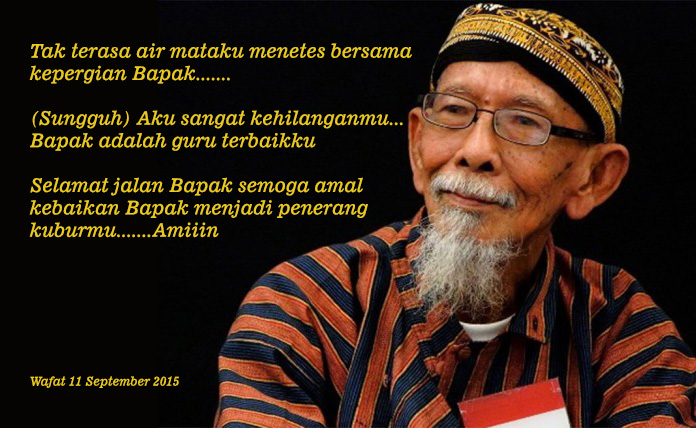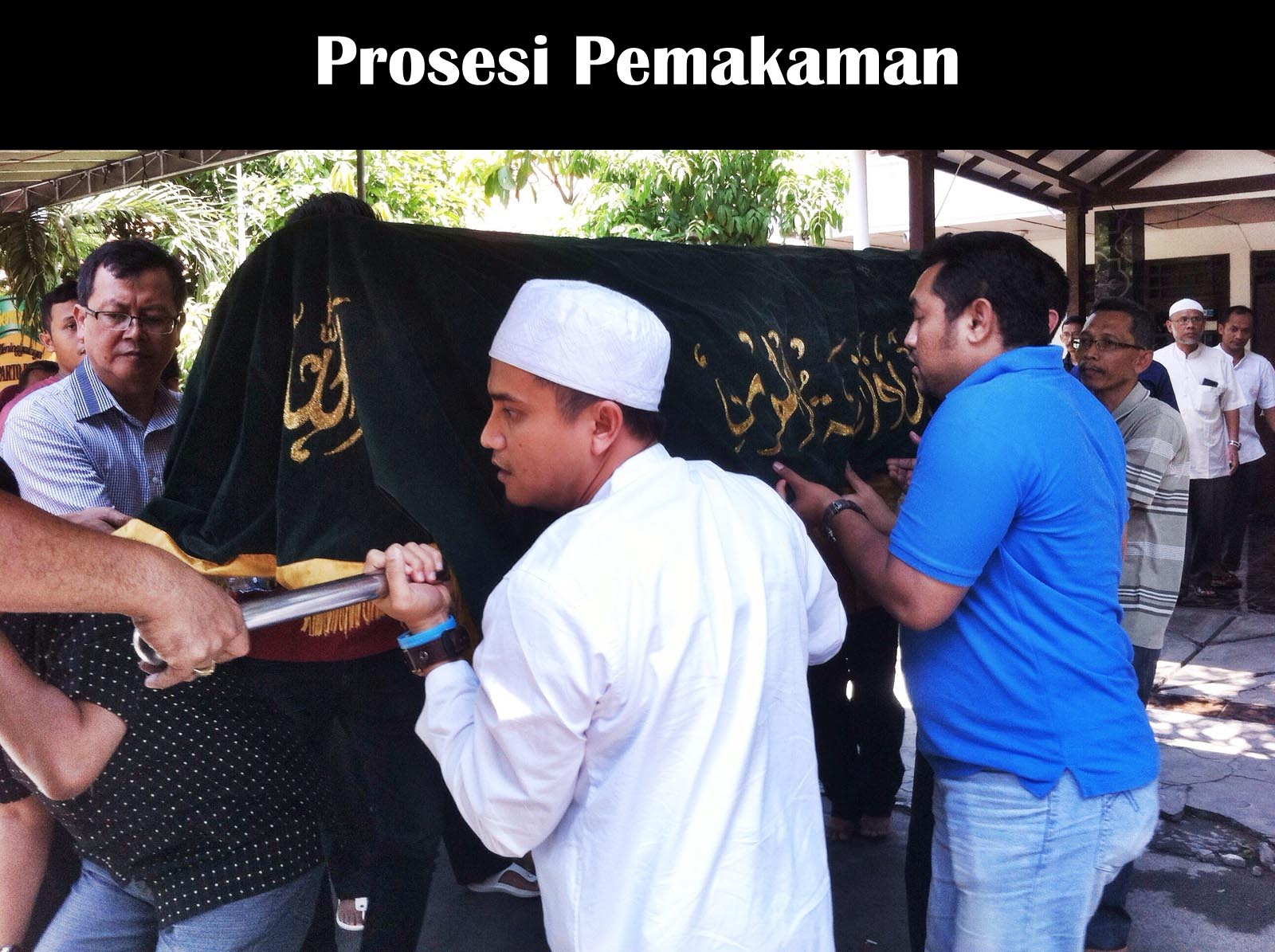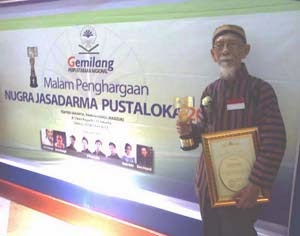Suparto Brata: Writing to the last breath
Ganug Nugroho Adi, Contributor, Surakarta, Central Java | People | Fri, July 26 2013, 12:42 PM
At the age of 81, novelist Suparto Brata still looked vibrant, attending the launch and discussion of his book, Tak Ada Nasi Lain (No Other Rice), at the Sudjatmoko Center, Surakarta, Central Java, recently.
“Writing books has always made me feel buoyant. I’m always enlightened as I follow book discussions like this,” said the senior writer.
Born in Surabaya on Feb. 27, 1932, Suparto never imagined he would be a novelist. His parents, Raden Suratman Bratanaya and Bandara Raden Ajeng Jembawati, belonged to Solo’s nobility but they lived in needy circumstances. His father went to Surabaya as a casual worker and his mother was a babysitter and batik maker.
“My mother took me to Solo when I was six months old and my father died when I was small. I was guided by my brother, who was ten years older, but he directed me more toward technical education,” recalled Suparto. Solo is the nickname of Surakarta.
He was acquainted with story writing through his friend in primary school, Rubai Katjasungkana, who frequently brought in story books. They read together and discussed the substance of the books. Sometimes, they tried to rewrite what they had read, adding their own imagination.
“One of my favorite books was Don Quixote de la Mancha [by Cervantes, published by Balai Poestaka, 1932]. I still have the book,” revealed Suparto.
While in junior high school, along with Rubai he created a school newspaper, Api Murid [Students Spirit], containing school events and short stories. Read by their schoolmates, the paper they were proud of was finally banned by the school for no apparent reason.
After graduation he joined his mother in Solo, where he started his career as a writer. Even when he worked with the Telegraphic Office, he carried on his writing activity. His stories, mostly in Javanese, were published by various media outlets.
In 1958, Suparto won a competition in serial writing in Panjebar Semangat, a Javanese magazine, and later he won similar contests in Mekar Sari, Jaya Baya, Djaka Lodang, Jawa Anyar and Dharma Nyata.
Then, he practically relied for a living on writing, as a freelancer for several national media outlets
such as Siasat, Aneka, Mimbar Indonesia and Kusah Tanah Air. He also wrote martial arts stories for CV Gema Solo (owned by author Kho Ping Hoo).
Until 2005, Suparto’s fiction work saw him deliver 122 titles in Indonesian and Javanese, in the form of short stories and novels. Some of his phenomenal work included Saksi Mata (Eyewitness), Gadis Tangsi (Barracks Girl), Kerjaan Raminem (Raminem’s Work), Omnibus, Garuda Putih (White Eagle), Republik Jungkir Balik (Upside-down Republic) and Tak Ada Nasi Lain.
His long years of intense writing earned him a record in the Five Thousand Personalities of the World, Sixth Edition, 1998, published by the American Biographical Institute, Inc. Suparto also received a Rancage Literary Award for his two Javanese novels, Trem (Tramcar, short stories, 2001) and Donyane Wong Culika (Deceptive World, romance, 2005).
Rancage is the highest honor for those who have contributed greatly to the development of regional languages and literature, conferred by the Rancage Cultural Foundation (founded by cultural expert Ajip Rosidi).
In 2007, the Javanese was also named one of the best Southeast Asian writers for his novel, Saksi Mata, by the Kingdom of Thailand, and granted the Southeast Asia Writer Award.
This appreciation took him back to Thailand in April to attend the Bangkok World Book Capital 2013, the 35th program of the SEA Write Award, and the 30th anniversary of the alphabet writing of Thailand.
He had the opportunity to meet with a number of world writers like Lord Jeffrey Archer, Frederick Forsyth, VS Naipaul and Sarah Bradford (who wrote the biographies of Jacqueline Kennedy Onassis, Disraeli, King George VI and Queen Elizabeth II.
“Being an author isn’t just a matter of how to write good works, but rather, how to be loyal to the job. You will never write good books unless you have a reading tradition. Writing should also be done continuously,” said the writer of Mentari di Ufuk Timur Indonesia (The Sun on Indonesia’s Eastern Horizon).
Regarding this reading and writing tradition, Suparto criticized the national education curriculum with its greater emphasis on physics and mathematics than on subjects to induce the culture of reading and writing among students.
Suparto appeals for active young writers to keep up their creative spirit by writing poems, short stories, essays and whatever else, which will definitely be useful though they may not be published.
But financial conditions permitting, he suggests the writers print, publish and sell their books themselves to minimize risks, because not all publishers are fair.
“I myself have never bothered about honorariums or royalties. I’ve once financed the printing of my books and let a publisher sell them. So far I’ve never been told if my books have been sold out or not,” he related.
The other bad experience was when Suparto sent his four manuscripts to a publisher who was only prepared to release two of them in book form.
In reality, the four books were printed and sold while he got paid only for the two of them.
“If you’re not yielding as I am, you’d better publish your books yourself to prevent such things from dampening your writing enthusiasm,” advised the husband of the late Rr Ariyati.
Suparto admitted he felt his authorship had been completed when in May Kompas publishing house issued his novel, Tak Ada Nasi Lain, which he wrote in 1958.
For 55 years, he had kept the book as no publishers dared to reprint during the previous repressive government.
Tak Ada Nasi Lain, Suparto’s first novel, fictionalizes his personal life during the period of 1938-1958, against the background of the Japanese occupation, Dutch invasion, communist uprisings and independence war along with accompanying events.
Now, at his advanced age, Suparto claimed he would continue to write not only fiction but also essays and testimonials.
“While I’m strong enough, I’m going to write until I die,” he said.





































